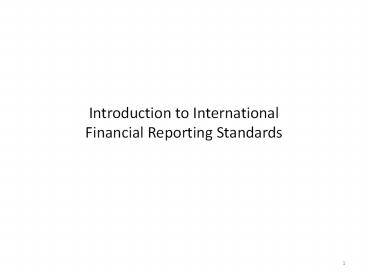Introduction to International Financial Reporting Standards - PowerPoint PPT Presentation
1 / 10
Title:
Introduction to International Financial Reporting Standards
Description:
Arial Calibri Office Theme Introduction to International Financial Reporting Standards GAAP Should have said sources of US GAAP Why Rules Differ ... – PowerPoint PPT presentation
Number of Views:71
Avg rating:3.0/5.0
Title: Introduction to International Financial Reporting Standards
1
Introduction to International Financial
Reporting Standards
2
GAAP
- Traditional Sources
- AICPA ARBs (AICPA Committee on Accounting
Procedures) and ABPOs (AICPA Accounting
Principles Board) - FASB Statements of Financial Accounting
Standards, Financial Interpretations, Emerging
Issues Task Force (EITF) Abstracts, etc. - Securities and Exchange Commission (SEC)
3
Should have said sources of US GAAP
- GAAP for the most part has been country specific
- Differences between countries may be cosmetic or
substantive - Example In UK balance sheet presentation has
traditionally been A L OE and also in
reverse order of liquidity. These are cosmetic
differences. - Again in the UK when Glaxo Wellcome plc merged
with SmithKline Beecham plc to form
GlaxoSmithKline they used the pooling method for
the consolidation. This method combines the two
companies utilizing historical costs rather than
the US approach which uses fair market values and
records goodwill. Pooling has not be allowed per
US GAAP for decades. This is an example of
substantive difference.
4
Why Rules Differ Internationally
- Short answer rules are established by
governments or accounting bodies that have
jurisdiction only within their respective
borders. - One still might think that given the desire for
orderly capital markets and efficient allocation
of scarce resources the rules would end up
virtually the same.
5
Factors Affecting Standards
- Sources of capital
- Inflation
- Taxation
- Culture
- Legal system, code vs. common law
- Code countries such as France and Germany tend to
have detailed, comprehensive accounting
regulations. Common law countries like the UK
and US typically have accounting rules that are
less detailed and require higher levels of
professional judgment in their application.
6
More Factors Affecting Standards
- Accidents of history war, conquest, and
colonialism - (http//en.wikipedia.org/wiki/Commonwealth_o
f_Nations) - Business complexity
7
Other Types of Differences Between Countries
- Tax-based accounting
- In some countries the tax treatment for a
transaction must also be used in financial
reporting. Hence tax revenue considerations
drive standards rather than a comprehensive body
of accounting theory. - Asset revaluations
- Some countries allow periodic revaluation of
assets. This leads to a lack of comparability
for assets and equity as compared to an entity
that did not revalue.
8
Other Types of Differences Between Countries
- Form over substance
- an underlying concept in US and many other
countries accounting standards. - If a lease appears to transfer the risks and
rewards of ownership its treated as a
sale/purchase (capital lease). - Some countries rely on the form of the
transaction only - If it is a lease it is accounted for as a
(operating) lease.
9
Demand for International Accounting Standards
- Prior to the 1970s cross-country accounting
differences didnt much matter. - Most businesses and capital transactions did not
cross international borders. - Multinational companies
- Growth of global capital markets
- Economic interdependence and the rise in
multinational political organizations (EU) - Reduction of costs
10
Impediments to International Standards
- Who is going to make up the rules and who is
going to pay for the process? - What will the rules be like (uncertainty)?
- Significant transitional costs.
- How will rules be enforced?
- Nationalism.
- Carve outs.































